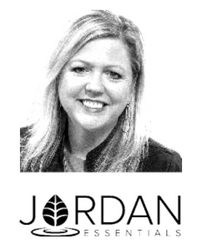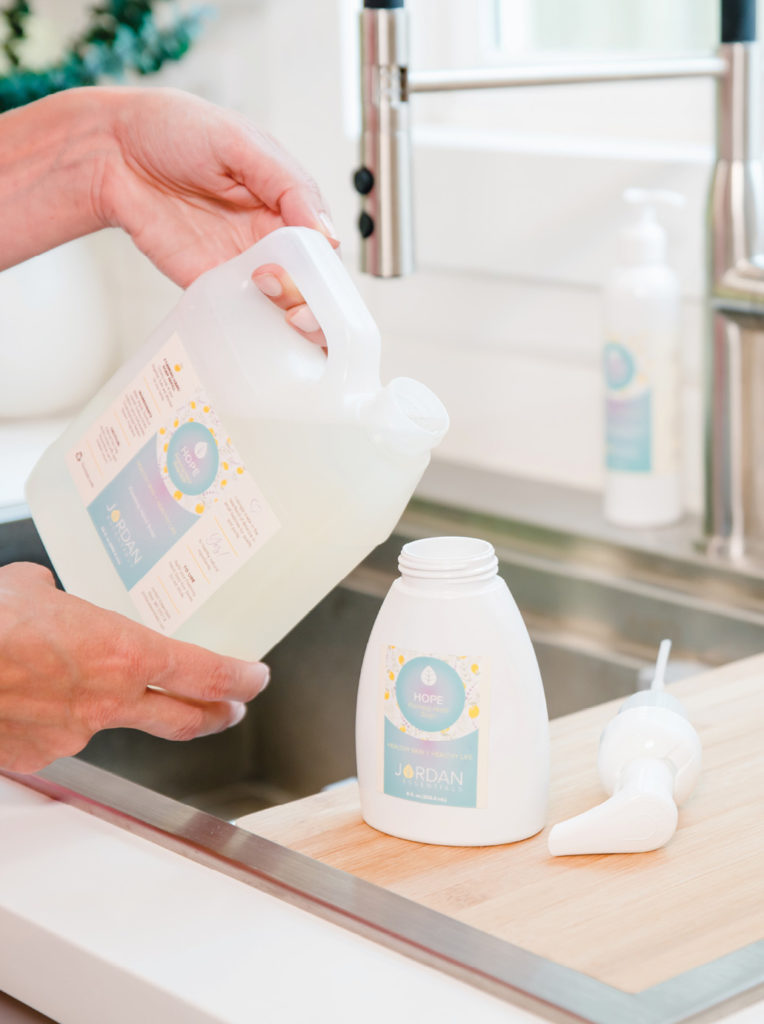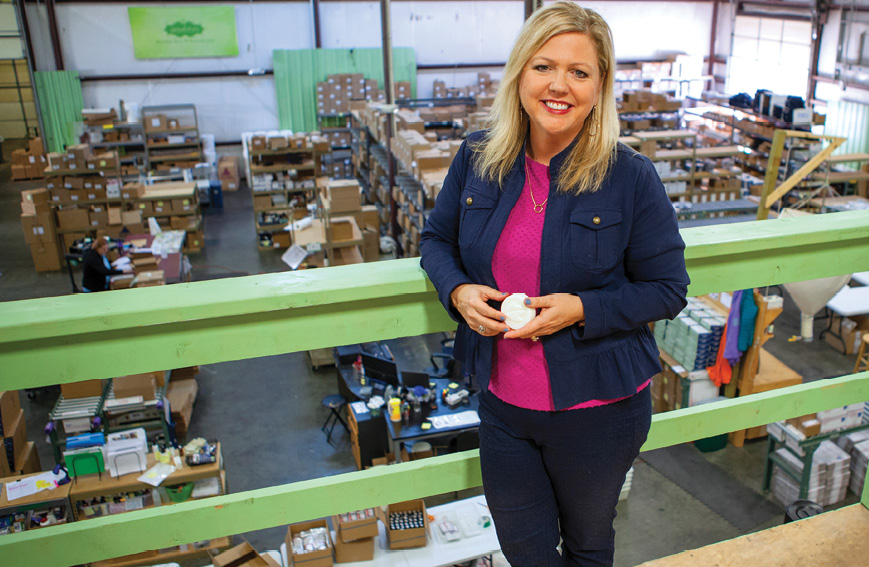Hybridizing Old School Party Plan

Founded: 2000
Headquarters: Nixa, Missouri
Top Executive: Nancy Bogart, Founder & CEO
Products: Skin and body care products, cosmetics
It was March and the world beset with coronavirus when Nancy Bogart returned to her company’s Missouri headquarters from a speaking engagement and rallied her Jordan Essentials corporate team and field leaders, projecting a tenacious spirit inherited from an entrepreneurial family.
“It was a fact that we weren’t going anywhere. It was not an option,” Bogart, founder and CEO, says of her commitment to the people and the company she created more than two decades prior.
But the old-school direct selling party plan, where Jordan Essentials firmly planted itself and grew for 20 years, looked increasingly vulnerable in light of the pandemic. “I felt that if we did not pivot, we were going to be in trouble,” states Bogart.
“I came back and pivoted into online parties, which they really did not want to do. So, within three weeks, I had pivoted the entire company, and we took off in April,” says Bogart.
And by taking off, she means the once-reluctant Jordan Essentials field quickly realized the true power and advantage of online business. They did this adapting and then embracing new ways, and eventually making 2020 the best sales year in company history—marking roughly 45 percent growth for the privately held company.

No easy feat for a company whose consultants—some of whom helped launch the company—relished in-person parties, loved inputting orders, receiving product shipments, repackaging orders and delivering them to their customers. Jordan Essentials was old school. But now, it would be something new, different, and better than ever.
Put It in Their Hands
At 30, Bogart was running after three young sons, not thinking about running a business. The oldest was born blind in his left eye, and the subsequent medical journey caused her to quit her job. Two more boys joined the family and seven years passed before heading back to work was a common conversation between her and her husband.
With a degree in hospitality, Bogart’s career dreams of big parties, catering, sales and hotel event planning seemed impractical. “First of all, financially, how do you do that? Then, how do you find day care for three little boys, and do you really want to do that?” she remembers asking herself.
A good dose of inherited tenacity and an entrepreneurial mindset sent Bogart into the kitchen to solve her dilemma. Inspired by the solid perfume bars her grandmother once made, she says, “I invented a little lotion bar—a solid bar of lotion.”
Thinking she could make enough money to pay for Christmas and get her husband off her back about returning to work, Bogart and her mom—who made local history as one of the first automobile saleswomen in the St. Louis metropolitan area at a time when that subjected her to ridicule and harassment—set up at a vendor show.
“Mom said, ‘Put it in their hands.’ The rest is history. We sold $7,000 in three days and decided we could do something more with it,” says Bogart.
Zero to Multimillion in Two Years
Applying a traditional party plan model took the company to multimillion-dollar status in two years, and by 2007 they rebranded, ditching the name Country Bunny Bath and Body. “Obviously, no market study there,” she quips.
Bogart took over as CEO, learned more and more about manufacturing products, and shifted their catalog natural—free from dyes, gluten, parabens, aluminum and more. Today, alongside their flagship lotion bar, Jordan Essentials shares purposeful, family-safe lotions, sprays and skincare products, body and face care products, and botanically based mineral makeup.
A staff of around 45 employees—give or take—keeps this debt-free, extraordinarily self-sufficient company humming. Bogart says they’ve created a rock-solid base. They are well held and well run because they hire to ten core values or expectations. They review to them and, if necessary, release people through those as well.
“We want humble and hungry, people who love people,” she describes. “We tend to attract hard workers—that’s where all those sales come from in the field—and open communicators that do unto others, are lifelong learners and support others with words and deeds.”
Teamwork, truth and honesty are vital. Try to game the system or sow discord, and Jordan Essentials calls it out, even if the culprit has huge sales numbers. But in the competitive direct sales market, they just don’t have big turnover in the home office or in the field.
Unlocking Potential
When pandemic pushed and pushed hard, Bogart—who is a take action type of leader—pushed back with reciprocating force and determination. Challenges morphed into opportunities to swerve left and bob right. Fueled by high trust and excellent communication among the HQ staff and the sales field, Jordan Essentials not only survived but accelerated sales unlike any other time in company history.
“It is interesting, isn’t it, that the pandemic kind of unlocked our potential? We [direct selling companies] all braced ourselves, wondering if we were all going to go down. Many of us went up, but not all of my party plan brothers and sisters in the industry did,” says Bogart.
To do so, they took bold moves that meant unmooring a decades old business model in favor of a brand-new hybrid way of doing business. This involved a complete software conversion, which included intense preparation and revamping their old system, as well as redesigning nearly every component of their business model from on-boarding and training to back-office use, shipping and eventually redefining consultants and consumers.
The complexity of this change, which went live last fall, threads through the entire organization and lands Jordan Essentials’ business model somewhere between party plan and direct to market/consumer.

Redefining Consultants and Consumers
2020’s growth was crazy to keep up with and so much fun, Bogart says. That momentum signaled an opportunity to redefine who really was a Jordan Essentials consultant. It was a difficult decision that Bogart did not enter into lightly.
From its inception, Jordan Essentials functioned with a no-minimum, 25 percent consultant discount, but that muddied the “consultant” definition. Some ordered only twice a year, while others built businesses. Clearly differentiating consumers and consultants and setting minimum qualifications to remain active would produce a more sustainable future. Their new plan went live in March 2021.
“Now that the consumer purchases and uses the hostess program and partnership for free product—which is what they really want—the consultant’s paychecks have gone up. With the stronger leadership base, consultants are making more money. When they recruit somebody, that person is more solid when they are starting a business and understand what it takes,” says Bogart.
Recruitment conversations feel different today too. “That’s something that’s held us back in the past, and now it is one of my strategies for the future to have that strong conversation for sponsoring along with these great products that we all love,” she states.
A new high-touch, decentralized on-boarding and training methodology is underway. This gives field leaders more autonomy to train downlines using real-life success stories and blunders, plus advice on overcoming supported by traditional back-office tools and reference materials.
“People don’t want to come in and be trained by a robot. They want to know and be known right now. It’s a weird world, and people want to feel a connection to a human. So, I feel like that’s what’s going to give us an advantage,” Bogart says.
At the same time, Jordan Essentials is coaxing seasoned consultants to pull back slightly on the high-touch, cumbersome party plan tradition of repackaging and delivering whole party orders.
“That’s definitely a hurdle we’ve had to overcome. We still love that high-touch customer service piece, but we’re trying to merge that with a really effective [direct to consumer] software system,” says Bogart.
Clearing Pandemic Hurdles
With the pandemic came some very specific hurdles, but unlike many companies, supply chain disruptions didn’t slow Jordan Essentials down. Nearly self-sufficient, they manufacture products and own a label printing press. Accurate forecasting allowed them to stock up in their own warehouses to ensure supplies.
“Some things were out of our control like cosmetic production shut down on the East Coast. But we had other things to sell, so we adapted and focused on other things,” explains Bogart.
For those slight hiccups, they taught the field, “This is your same great product, but your bottle may be purple. It’s going to be okay,” she describes.
More difficult—at least emotionally—was the shortage of large-scale, live events. Their field uses these conventions as mom getaways and bonding time, and they are vital to their culture. Virtual was the only option in 2020, and Bogart says herculean efforts of staff produced a terrific event that attracted record numbers. Still, she felt sad and missed the collegial atmosphere of gathering in person.
“It really increased the depth and breadth and love for my company and my people and what I do and how I do it,” says Bogart.
They’ve cautiously and safely drawn people together in 2021, hosted a record number of attendees at a recent stateside incentive trip and created a hybrid national convention in July that got great reviews. With about ¼ of convention attendees seated and ¾ at-home, they utilized Facebook live to interact with at home attendees. At the same time, speakers took the live stage, and continued the tradition of recording product launch announcements to provide long-term access to the field.
The way forward for Jordan Essentials looks a great deal like the company’s journey over the last 18 months. Bogart expects to slough off some of the old methods that they’ve always done, find new patterns, and pivot.
“I see it so clearly in front of us now. We want to become that solution for people looking for a party plan company that is innovative and isn’t going to go right back, solely into homes. We will continue to invest in technology and advance. We’re not going to kick back. I’m not a kick back kind of person,” she states.


